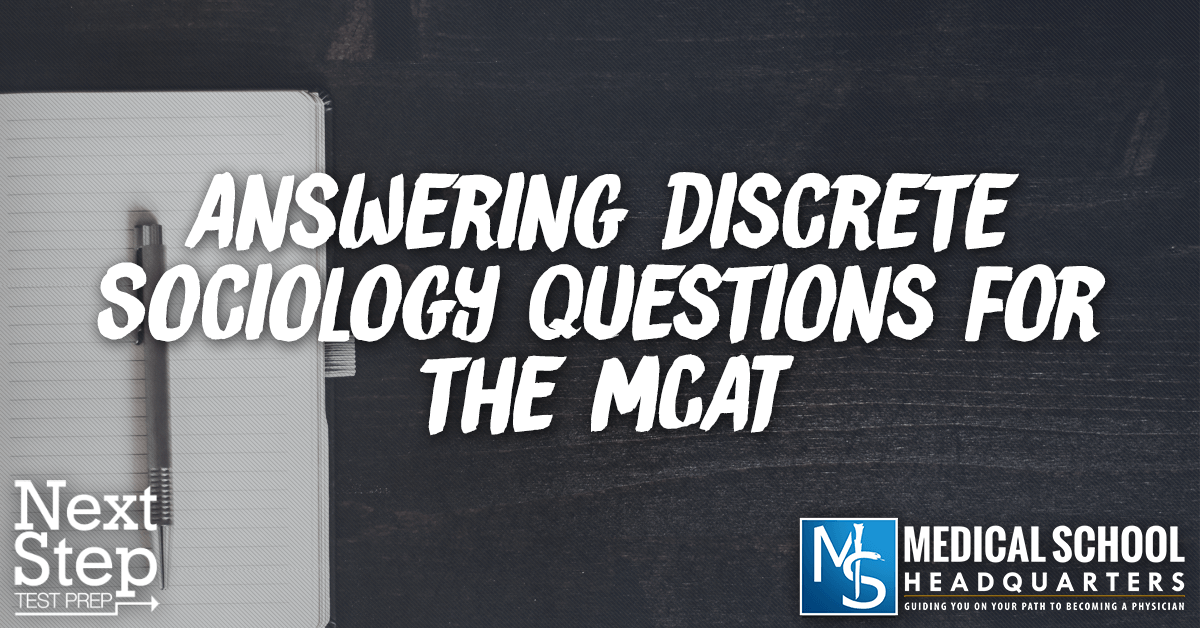Apple Podcasts | Google Podcasts

Session 44
This week, we’re diving into some Sociology, which is another new section on the MCAT. Listen in as Bryan and I discuss how you can dissect these questions and essentially do well on the MCAT.
[01:30] A Big Mistake
Bryan says one big mistake students make with sociology is not taking the technical nature of it seriously enough. A lot of the sociology terms are words that sound like you should be able to infer them from normal English conversational words and students very often failed to realize in the Psych/Social section, especially the Sociology part, that the words have very precise and very technical definitions. They get a little cavalier about it in a way they would never do with, say, physiology.
[Tweet “Students very often failed to realize in the Psych/Social section, especially the Sociology part, that the words have very precise and very technical definitions. https://medicalschoolhq.net/mp-44-answering-discrete-sociology-questions-for-the-mcat/”]
[02:20] Question #16:
Mead Social Theory presents the part of the self which is called the “me” as the:
- (A) Autonomous sense of self that reacts to the attitudes taken in from society
- (B) Part of the self that generates moral behavior and is critical of the self’s thoughts and actions
- (C) Collection of attitudes taken from society
- (D) Organized realistic part of the self that mediates between based desires and moral impulses
[03:00] Bryan’s Insights:
Yes, the word “me” is a technical term on the Psych/Soc in MCAT. Answer choice A which talks about the autonomous sense of self is part of Mead’s theory and that’s what’s called the “I” as there is “I” and “me.” So answer choice A is “I.”
Answer choice B is Freud’s superego, which is this kind of a rational part of your mind that is hyper moral and criticizes you for not following those moral codes. Answer choice C, the collection of attitudes taken in from society, is the right answer here. “I” am the autonomous self that reacts to that while the actual sense of attitude that I take in from society is the “me.”
Answer choice D, the realistic part that mediates between based desires and morals is Freud’s theory and that’s the ego. You have the “id,” which is the raw animal impulse and the ego has to mediate the id’s impulses driven by the super ego’s morality.
These answer choices mix together Freud and Mead and they expect you to be able to pick out collection of attitudes taken from society as the me.
[04:25] Question #17:
A highly exclusive new restaurant opens in the nation’s busiest metropolitan area. Within days of opening, the restaurant’s reservation list is booked for the following two years. The best friend of one of the acquaintances of the maître d’ is able to get a table one night with no reservation. The best friend…
- (A) Demonstrated use of social capital
- (B) Took advantage of his personal charismatic authority
- (C) Got something to spike the lack of social status
- (D) Has high cultural capital
[05:00] Bryan’s Insights:
The correct answer here is choice (A). The definition of social capital is very value, derived from who you know, from who you are networked to socially. The classic example of social capital is not getting a reservation in a restaurant but it’s actually more serious.
If you suddenly find yourself unemployed, that can be life-destroying or it can be an inconvenience depending on your social capital. If you know ten people, you can call up and ask them to hook you up with a job and you are getting a value, a new job, based on who you know.
Relating this to medical school, as you are looking at what medical schools to apply to, if you happen to know the Dean of Admissions at the medical school then you’ve got some social capital.
You don’t want to confuse social capital and cultural capital. This goes back to the idea that students sometimes think it just means what it says. You don’t need to take an extra second to memorize the technical terms. Bryan sees a lot of students get those confused while they’re taking the test. Social capital refers to people, who you know and social networks. Cultural capital is anything of value that’s not literal money or people. For example, having a really good vocabulary, having a really good fashion sense, or having an MD. Literally, the MD itself is not money but cultural capital that has tremendous value.
[Tweet “You don’t want to confuse social capital and cultural capital. This goes back to the idea that students sometimes think it just means what it says. https://medicalschoolhq.net/mp-44-answering-discrete-sociology-questions-for-the-mcat/”]
[06:45] Question #28:
Which of the following subcultures would least likely be described as a meritocracy:
- (A) A gang whose leader has chosen based on how many members of a rival gang he has killed.
- (B) A financial firm in which the yearly bonuses paid out to employees are based on the performance of the financial assets managed by each employee over the past five years, not just the past year.
- (C) A college department that grades all of its exams anonymously using automated grading software and randomized student I.D. numbers that are unknown to the professors.
- (D) A financial firm in which many of the vice president positions are occupied by close family members of the members of the board of directors.
[07:35] A “Least Likely” Question
Answer choice C is the second most popular chosen question by their students. Bryan discusses the definition of meritocracy. It’s a society in which advancement is based on merit, which means skills, credential, achievements, etc. You have to have done things to merit your advancement and position in that society.
In a hyper-violent society like a gang, successfully killing your gang rivals would be meritorious. So answer choice A sounds like a meritocracy. Answer choice B also sounds like a meritocracy. If you’re successful in your financial firm and making a lot of money, then that’s how you get the bonuses. Answer choice C says that things are graded anonymously so it suggests nepotism or corruption can’t play a role. You can’t get a good grade just because of who you are because the grading is anonymous. So this choice actually sounds like a meritocracy.
More importantly, in the case of answer choice D where all the vice presidents are family members of the board of directors, that would be the exact opposite of a meritocracy. You’re not being named vice president because of achievement but because of nepotism and you’re related to somebody important. So the least likely to be a meritocracy here would be answer choice D.
[09:40] Question #31:
Throughout much of its recent existence, Indonesia has had a very strong economy with sharply defined and well-functioning political structures. Its economy and military with some of the strongest in the region while neighboring Papua New Guinea had much weaker systems and almost wholly dependent on Indonesia for trade and protection. Indonesia could be described as:
- (A) An undeveloped nation
- (B) A semi-periphery nation
- (C) A core nation
- (D) A periphery nation
[10:20] Bryan’s Insights:
Based on the clues given to you, this is a nation that has well-functioning political structures with a strong economy and military and the nearby neighboring nation is dependent on that. You’re not expected to walk in knowing anything about Southeast Asia and you’re just given the facts. But this is actually the definition of a core nation, a strong nation that has good politics, military, and economic structures and other nations are dependent on them.
Periphery nations are the weaker nations with poorly functioning political structures, weaker economies and military and they depend on their neighbors. Semi-periphery would be the halfway point between those two.
Another example of this is America being the core nation and Mexico as the semi-periphery neighbor and an essential American country that has weaker structures as a periphery nation.
[12:10] Final Thoughts
Bryan leaves us with this takeaway: Don’t take sociology lightly and make sure you memorize those terms.
[Tweet “Don’t take sociology lightly and make sure you memorize those terms. https://medicalschoolhq.net/mp-44-answering-discrete-sociology-questions-for-the-mcat/”]
Lastly, go check out Blueprint MCAT (formerly Next Step Test Prep) and everything they have to offer. They have a ten-pack MCAT full-length exams and an MCAT course, an on-demand, do-it-yourself course that includes five live office hours every week. They are also best known for their one-on-one tutoring, the best in the business. Use the promo code: MCATPOD to save some money on their products and services.
Links:
Blueprint MCAT (formerly Next Step Test Prep)
Transcript
Introduction
Dr. Ryan Gray: After you’ve taken the MCAT, the medical school application process, an interview is next. Enter to win a copy, one of fifty copies of my book ‘The Premed Playbook: Guide to the Medical School Interview.’ Enter by June 4, 2017 by texting ‘BOOKGIVEAWAY’ all one word to 44222.
This is The MCAT Podcast, session number 44.
A collaboration between the Medical School Headquarters and Blueprint MCAT (formerly Next Step Test Prep), The MCAT Podcast is here to make sure you have the information you need to succeed on your MCAT test day. We all know that the MCAT is one of the biggest hurdles for a premed, and this podcast will give you the motivation and information that you need to know to help get the score you deserve so you can one day call yourself a medical student.
Welcome back to The MCAT Podcast, or welcome if this is your first time. I hope it’s not. If it is, you have a lot of episodes to go catch up on. They’re all great, I promise.
My name is Dr. Ryan Gray, host here at The MCAT Podcast, and all of the podcasts at Med Ed Media. Not all of them, but a lot of them. We do have an awesome podcast that is put on by the University of Iowa Carver College of Medicine. That is the Short Coat Podcast, you can check them out as well. Again, all of our podcasts over at Med Ed Media. That’s www.MedEdMedia.com.
This week we’re going to dive into some sociology.
So Bryan, there are four sections on the MCAT. Three of them are more sciencey, and one is this random CARS that seems to demolish everybody. It used to be verbal reasoning, now CARS, now it truly is a four letter word for the MCAT. What are your suggestions for how to best prepare for the CARS section?
Preparing for the CARS Section
Bryan Schnedeker: Yeah Ryan, so I’m sure all of our very erudite listeners know that CARS stands for Critical Analysis and Reasoning Skills. And really the name isn’t the only thing that got an upgrade. It’s a longer, tougher section than the old verbal reasoning. And I think the name really points out is critical analysis and reasoning skills. So one of the common pieces of advice that you read out there in MCAT land is, ‘Oh you should read a lot.’ Like read the Economist Magazine, or Atlantic Monthly, or something. There’s nothing wrong with that, right? I mean more reading is always good. Read, read, read, read, read. Best way to prep for the MCAT. But in and of itself it’s too passive this notion that, ‘Oh I can just sit and casually read a magazine and that’s enough to improve my skills.’ Yeah, that’ll bump up your reading, but it won’t build up that critical analysis and reasoning part. Instead what you have to do is focus very intently as you read, and I would suggest just read actual MCAT practice passages from a book or an online resources, something like the Next Step 108 Passage Book, and really think about the reasoning that underlies the passage. Not just what am I reading, but why is the author putting the passage together that way? So that’s kind of the philosophical stance we have to have is don’t just read, but critically analyze and reason. The other big important part of prepping for the CARS, and this is a major mistake that students make, is thinking that somehow there is one simple method that’s going to unlock everything. Like, ‘MCAT writers, one weird trick, they’ll hate you.’ Like it’s not that simple. And I think this idea is so pervasive that there is a ‘right way’ to do the verbal passages, because you see it get peddled a lot by different prep companies, or tutors, or books, or whatever will tell you, ‘Oh here’s the XYZ method for CARS.’ And they’ll present it like some sort of authoritative ‘this is the one and only one right way to do things.’
Dr. Ryan Gray: Well that’s what we like as humans, right? We want that simple weight loss pill, that one thing, because we don’t like to work hard.
Bryan Schnedeker: Right, all I have to do is eat thirty pounds of kale a day, and I’ll have my perfect bikini body. Right. Yeah it’s never something that simple, so to really master the CARS section, it’s not a matter of learning the CARS method, it’s a matter of finding your CARS method. You know some people like to use the onscreen highlighter. Some people like to stop every paragraph and jot some notes down on the scratch paper. Some people like to just skim real fast and get to the questions. Other people like to read kind of quickly and then write down the author’s main opinion, the author’s main idea. Like that’s the one thing they write down and then they go to the questions. There’s all sorts of different ways that you can approach these passages and questions, all different ways to be successful. And so the big lesson, the big takeaway point, the best way to prep for CARS is to try different things, keep track of your progress, what methods work for you and what don’t, and to do that as soon as you start your MCAT prep because you want to find your preferred method within the first one third to one half of your MCAT calendar so that you can spend the subsequent half or two thirds of your calendar mastering what works best for you.
Transferable Skills in Preparation
Dr. Ryan Gray: When you’re preparing for CARS, obviously- maybe not obviously, but in my mind when you’re reading and working through psych/social, and the other sciences, you’re using the same skills for CARS in those sections. Are those skills transferable?
Bryan Schnedeker: A lot of the skills are. I mean obviously the content isn’t because so much of the other science sections is just do you know these words? Right you’ve got to know a lot of concepts. The part that are transferable are looking at connections in the passage. You know in the sciences it’s all about okay, they set up the experiment to measure this, and then they did an [Inaudible 00:06:19] that, and how does this data support or not support whatever the experiment set out to do? And you can do the same thing in CARS. If it’s an argument about some form of poetry, you just look at that logic. ‘Oh the author is bringing up evidence PQR to prove point S and T, and countering opinion X’ or something. And if you can think on that structural level, how is the passage structured, that helps in both the science and the reading.
Dr. Ryan Gray: So you mentioned reading stuff like The Economist, and Atlantic, and all these more in-depth journalism that’s out there. As somebody who’s trying to increase their comprehension and analysis, how should somebody- do you have any recommendations on how somebody should read one of those articles and go through and ask themselves questions to see if they understand and took anything out of it?
Bryan Schnedeker: Yeah it’s definitely about focusing on opinion. That is what’s the author’s opinion? What are the contradictory opinions? And then once you’ve understood that, what are the various opinions being presented, you then take the next step and look at okay, what’s the reasoning to support those opinions? So you’re always looking for what’s the evidence the author uses to draw conclusions? And it’s one of those things where if you’re not consciously thinking about it, again it’s very easy to get passive because writers have a tendency to just present their own beliefs as if it was the truth. Present everything as if facts were incontrovertible and absolutely correct. So if you’re going to sit down and read something like a piece of long form journalism, just stop at the end of every paragraph and ask yourself, ‘Okay whose opinion is this? How does this support someone’s opinion? How does this refute someone’s opinion?’
Dr. Ryan Gray: Interesting. Alright, any other things that we didn’t talk about for CARS?
Bryan Schnedeker: I just want to reiterate start early, start early, start early. The day to start your CARS practice is the day you start your MCAT practice.
Dr. Ryan Gray: So you’re staying start early.
Bryan Schnedeker: Yeah, start early.
Final Thoughts
Dr. Ryan Gray: Alright there you have it, some sociology for the MCAT. Hopefully with this episode, and breaking down all of the questions that we do here as well as every other week talking about breaking down and the thought process behind answering questions on the MCAT, we’re helping you achieve your goals of crushing the MCAT and getting that medical school acceptance.
Go check out everything that Blueprint MCAT (formerly Next Step Test Prep) has to offer. It’s not just this podcast that they offer you. They have a ten-pack of MCAT full length exams that you can buy, they have an MCAT course, kind of an on-demand do-it-yourself course that includes five office hours every week- live office hours every week. They also are best known for their one-on-one tutoring; the best in the business. Go check out everything they have to offer at www.NextStepTestPrep.com. Use the promo code MCATPOD, that’s all one word, all capital letters, MCATPOD to save some money on their products and services.
I hope you got some education out of today’s episode. I hope you join us next week here at The MCAT Podcast, and Med Ed Media.
SEARCH SITE
SEARCH SITE
LISTEN FOR FREE











